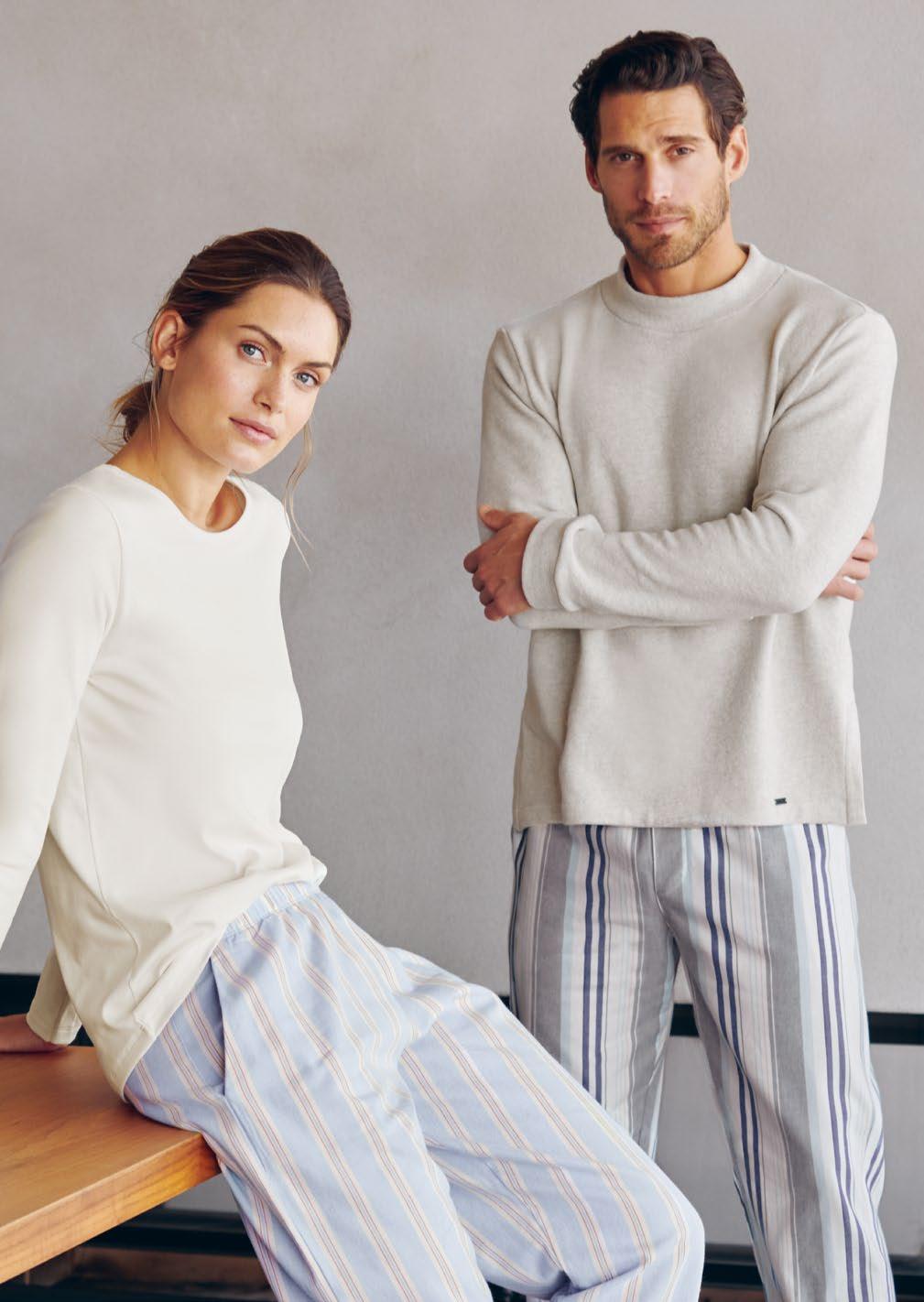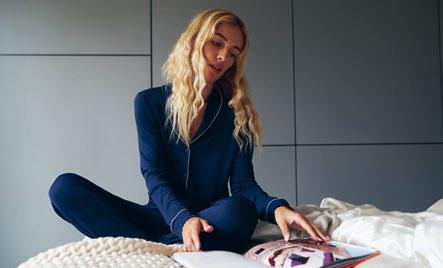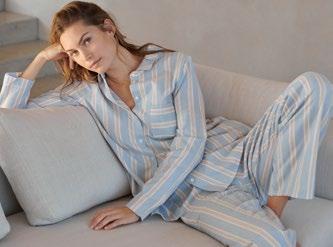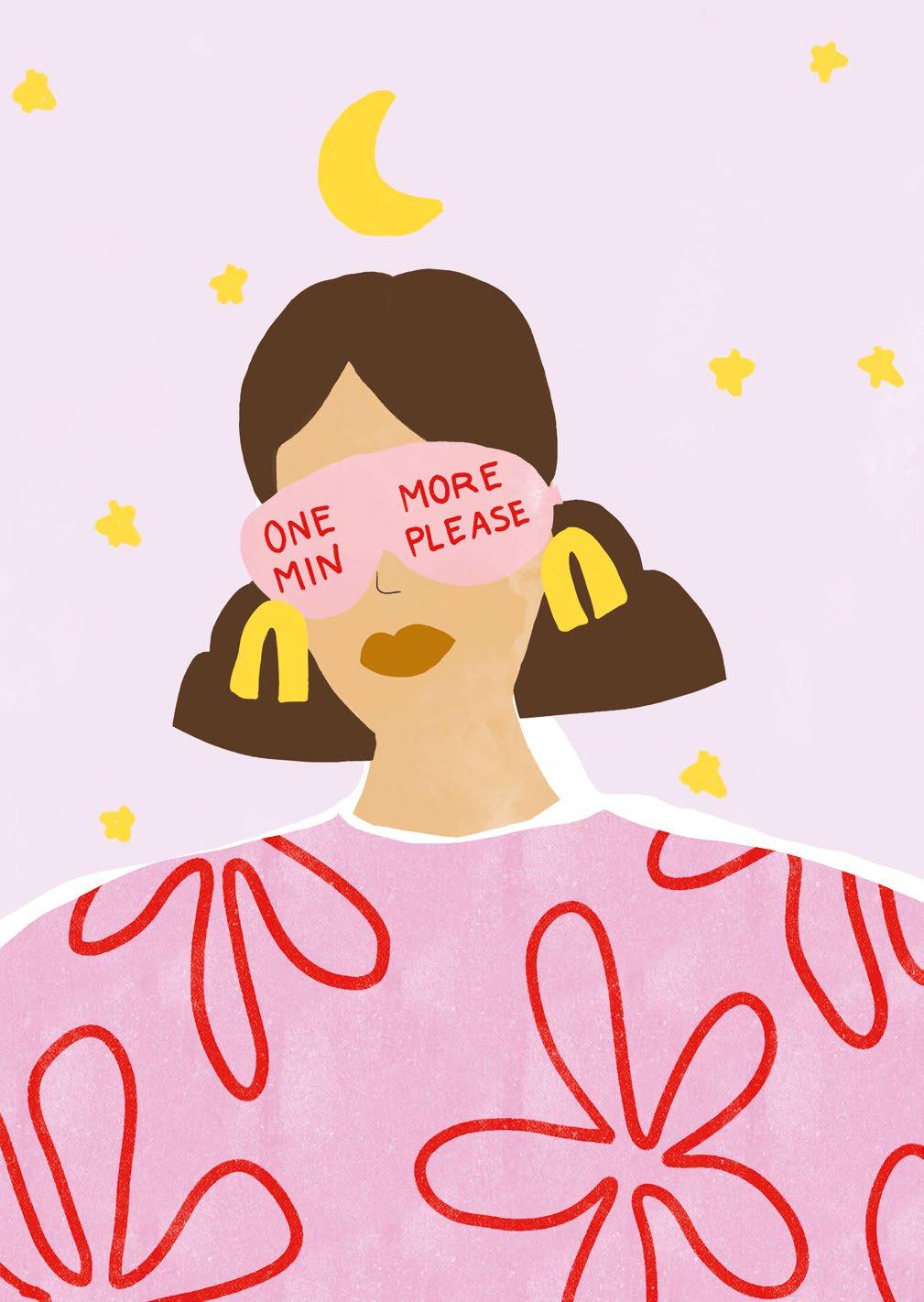the art of sleep

SUSTAINABLE
Nothing says HANRO like sustainable nightwear that feels good on your skin.
After all, you enjoy the most comfortable nights of sleep while wearing natural, breathable, and skin-friendly materials.



Nothing says HANRO like sustainable nightwear that feels good on your skin.
After all, you enjoy the most comfortable nights of sleep while wearing natural, breathable, and skin-friendly materials.

It's true what they say, a good night's sleep is worth its weight in gold! Nothing is quite so important to our health, quality of life, and wellbeing. And yet, more and more people find it difficult to sleep. We therefore decided to create a magazine dedicated to sleep. True to its title "the art of sleep," this magazine approaches sleep from a variety of perspectives to inform, surprise, entertain, and inspire its readers.
Sleep psychologist Prof. Günther W. AmannJennson confirms that most people suffer from chronic sleep deprivation and explains what we can do about it. And sleep is not only relevant to the field of science, but also makes its way into the work of artists, literary figures, and philosophers. You'll find several beautiful examples a little later in this magazine.
These works go hand in hand with the HANRO philosophy, which pays tribute to a sophisticated sleep culture marked by premium feel-good
STEPHAN HOHMANN has been the CEO of HANRO International GmbH for 16 years. A connoisseur of quality and top-of-the-line products, he also attaches great importance to beauty and minimalist style in his personal life. Stephan's values shape the unique look and feel of the HANRO brand.

materials, sustainable quality, minimalist style, and the greatest attention to detail. For almost 140 years, HANRO has been a champion of understated luxury. "Less is more, and only the best" – this maxim is our passion.
A self-professed fan of the brand, influencer and mother-of-three Viky Rader loves the way HANRO nightwear feels on her skin. She presents her favorite styles from the new collection and shares the rituals that help her relax at night despite her hectic everyday life.
Last but not least, we'll take you on a tour of the HANRO archives. We've been cultivating a sophisticated sleep culture since 1927. We hereby invite you to experience the illustrious history of our brand.
Happy reading!
"Seeing as I travel a lot for work, I've adopted a sleep routine that helps me fall asleep more easily: I eat a light dinner, go for a short walk, then read a few pages from my favorite book."
STEPHAN HOHMANN CEO
 Left: 'Loungy Nights' shirt and pants in cotton
Right: 'Cozy Comfort' shirt and pants made with recycled cotton
Left: 'Loungy Nights' shirt and pants in cotton
Right: 'Cozy Comfort' shirt and pants made with recycled cotton
Cognitive performance is directly related to the quality of sleep. Insights & tips for a better night's sleep.
A look back at our collections since the 1930s.
Van Gogh, Einstein, Goethe, Matisse...there's no shortage of artistic references to the domain of sleep.

HANRO interview with Prof. Günther W. Amann-Jennson.

Model, influencer, and supermom Viky Rader takes us to the land of dreams.
Discover nightwear that matches your way of life.


We shine the spotlight on your nocturnal fashion needs with our new Fall/Winter 2022 collectionas well as with our basics.
"Sweet sleep! You come upon us like pure happiness unbidden, unsolicited most willingly. You untie the knots of the sternest thoughts, blend images of joy and pain, allow the circle of inner harmony to flow without hindrance, wrap us in pleasing madness, and invite us to cease to be."
JOHANN
 'Lilova' viscose robe with Mystic Shadow Print
'Lilova' viscose robe with Mystic Shadow Print
Wow, is it morning already? We all know what it's like to wake up after a night of little or no sleep.
Sleep is an extremely fickle thing that can come and go for any number of reasons. It's therefore not always easy to pinpoint why you can't sleep. However, given that around 90% of people today don't get enough shut-eye, it's high time we take a closer look at the nature of sleep.
First of all, regularity and good timing are essential to proper sleep. It's not for nothing that the rising sun is our signal to get up and about, or that the hormone melatonin is released in our bodies at night to help us fall asleep and (preferably!) stay asleep the whole night through. And since our bodies - like any living thing - follow cycles and rhythms, you're better off giving in to this instinct and establishing a consistent time for going to bed and getting up in the morning.
An absolute no-no is a "digitalized bedroom," especially in today's world where we tend to use our laptops and smartphones until our eyes close. The radiation and blue light from digital devices have been shown to interfere with the process of falling (and staying) asleep.
And by the time we've finally laid our phones down to charge - in flight mode, please!our brains are no longer able to recharge fully because they have been flooded with images right up until the time we close our eyes and try to sleep.
According to experts, your bedroom should therefore be as minimalist as possible: a comfortable bed with a breathable mattress, a small table, a lamp, absolute darkness, a temperature of 16 to 18 °C, and the perfect nightwear are the ingredients for the kind of sleep we all crave but rarely get.
Brains that fail to recharge fully during sleep are unable to think positively and perform vital life-affirming processes. At full power, our brains can properly reflect on our experiences and think creatively and out-of-the-box, allowing us to be empathetic and make smart decisions. But all this requires energy, which is eventually exhausted and must be recharged, like a battery. According to Dr. Michael Nehls, author of the book "The Exhausted Brain," the "charging station" that serves this purpose is located in the hippocampus, which is found in the middle of the brain and named after a seahorse because of its shape. The hippocampus is where are memories are formed, and serves as the control

center between short and long-term memory. It has enough space for a day's worth of thoughts, impressions, and sensations that are relayed by synapses in the brain. When these synapses are overloaded (usually at the end of the day), your brain feels exhausted because its hippocampus has run out of space. At night, while we sleep, our brains "recharge," which is another way of saying they process our impressions from the day.
When it comes to sleep needs, everyone is different. Some people wake up nice and refreshed after six hours, while others need
ten hours to start the day on the right foot. Most experts recommend an average of seven to eight hours of sleep per night.
We also differ when it comes to when we go to bed at night and get up in the morning. These preferences are determined by our biological clocks and have an impact on the times of the day we are most efficient. In other words, at certain points in your life you're an owl, at others a lark. As babies, we get up early, while during our teenage years we sleep the morning away and want to stay up late at night. With age, we once again become early risers or larks.
Can you think of another exciting thing that happens while we recharge? That's right, we dream! Concretely speaking, dreams occur when the brain processes all the significant thoughts and experiences from the previous day and interweaves them with memories or existing knowledge.
In fact, night after night we get a little wiser. Dreams and their accompanying cognitive processes are not just important to our recharges, but also fundamental to our mental and emotional maturity. You may also experience a pleasant side effect: our brains consider everything we thought about before falling

asleep as important, and while dreaming, relate this information to previous experiences to offer new approaches to solutions which often feel like eureka moments in the morning.
Finally, a positive mindset anchored in deep faith or conviction or a greater purpose in life can help you fall asleep more relaxed.
A short meditation accompanied by deep and steady breathing through the nose can quiet the senses and help you let go.

To allow your digestive organs to detoxify overnight, try to refrain from consuming fatty foods, caffeine, or alcohol for up to three hours before going to sleep. Instead, nibble on a few nuts.
The right nightwear is vital to your overall sleeping comfort. High-quality, natural materials are pleasant on the skin and breathable to prevent sweating and freezing.
Exercise improves sleep: Outdoor activities are ideal, for the more sunlight the body absorbs, the faster the natural sleep aid melatonin is released in the evening.
"It's the possibility of having a dream come true that makes life interesting."Paul Coelho
'Accessories' Socks by HANRO
Scientists in the USA discovered that people who got under the covers with socks on their feet fell asleep around 15 minutes faster than those who were barefoot.
Socks create heat by improving the flow of blood in your feet. This causes your body temperature to drop, which in turn provides your brain with the impulse to induce sleep.

Save yourself the stress of last-minute shopping by picking up gifts for your loved ones today! Opt for premium nightwear, loungewear, and lingerie that is both durable and sustainable.

Swiss stone pine has been used as a sleep aid since the 18th century. The pleasant scent of the wood, whose chips are processed into pillow fillings, has been proven to foster sleep. These handy cushions can be placed directly next to your head or level with your eyes or forehead.

Did you know that there are 34 different sleeping posi tions? Sleeping on your back ("supine" position) is excellent for your orthopedic health. Sleeping on your side helps your brain to detox. Sleeping on your stomach is not recom mended as this position can be hard on your lower back.
Ready, get set, sleep!
With his sleep coach training program, sleep psychologist Prof. Günther W. Amann-Jennson has created an all-new profession. Like personal trainers, who try to improve athletic performance, sleep coaches strive to optimize biological conditions to help people sleep better. Learn more about the training here: www.schlafcoaching.com

"Over 90 % of our health depends on sleep."
HANRO has been celebrating the culture of sleep since 1927long before it became fashionable to get a perfect night of sleep. Our legendary archive in Liestal (Basel, Switzerland) features one-of-a-kind nightwear that caused a sensation back then and is still cult to this day.
The first HANRO nightwear collection: Liseuses, or so-called bed jackets done in specially knit fabrics, and floor-length nightdresses. Nevertheless, the super modern woman of the 30s opted for the collection's extravagant pajamas.


 This pajama look is reminiscent of the movie "Breakfast at Tiffany's" starring style icon Audrey Hepburn.
This pajama look is reminiscent of the movie "Breakfast at Tiffany's" starring style icon Audrey Hepburn.
Sleep culture rebellion: Miniskirts and short nightdresses revealing bare legs fueled the women's liberation movement.

The priority of our designers both yesterday and today: Premium quality and tasteful aesthetics.

 Top model icon Linda Evangelista was the face of the 1985 nightwear collection campaign.
Stylish nightwear became respectable. The 90s marked the birth of loungewear, which is so popular today.
Photos: Hanro Collection, Archaeology and Museum Baselland, Liestal ©HANRO International GmbH, Götzis.
Top model icon Linda Evangelista was the face of the 1985 nightwear collection campaign.
Stylish nightwear became respectable. The 90s marked the birth of loungewear, which is so popular today.
Photos: Hanro Collection, Archaeology and Museum Baselland, Liestal ©HANRO International GmbH, Götzis.
What does sleep actually mean in terms of our existence as humans? Artists, writers, and philosophers have approached the complex sensory phenomenon in countless different ways, cultivating sleep into a cultural treasure.

 The Sleeping Gypsy, Henri Julien Félix Rousseau, 1897: At the time of its unveiling, this painting was misunderstood and rejected by the public. Its integrated symbols are disturbing and play directly on our subconscious. Today, "The Sleeping Gypsy" belongs to the collection of the New York Museum of Modern Art.
The Sleeping Gypsy, Henri Julien Félix Rousseau, 1897: At the time of its unveiling, this painting was misunderstood and rejected by the public. Its integrated symbols are disturbing and play directly on our subconscious. Today, "The Sleeping Gypsy" belongs to the collection of the New York Museum of Modern Art.
short & sweet sleep!
Hurray for the power nap! But beware – if you nap for too long, you're likely to feel sluggish later in the day. Take Salvador Dali, who was an avid midday napper. Dali would plop down on an armchair with a spoon in his hand. As soon as his sleep became deeper, the spoon would come loose between his fingers and fall to the floor. Dali awoke, and feeling refreshed, resumed his work.

sleep while you can Albert Einstein was not only passionate about physics, but also sleep! He was said to have indulged in 12 hours of shut-eye a day, which in no way prevented him from becoming the most famous physicist of the 20th century. In fact, this exorbitant amount of time spent in the horizontal position actually fueled his mental activity. Rumor has it Einstein came up with his legendary formula "e=mc²" while he was just hanging around and unwinding.
"When you can't sleep because somet hing is bothering you, for heaven's sake don't try counting with clenched fists to thirty-seven thousand four hundred and eighty-six! Instead, make the best of it!
After all, you don't really need to sleep. You can also get on nicely without it. Above all, never try to force it; the will is the worst enemy of sleep."
HEINRICH SPOERLStamp with a drawing by Kafka
 Salvador Dali, photo by Carl Van Vechten, 1880-1964
Salvador Dali, photo by Carl Van Vechten, 1880-1964
"Getting up early dulls the brain. People need their sleep."
"I have an idea... I want to simply paint my room, but this time the color must do everything, and by simplifying it provide it with more style, with an overall effect of sleep and rest. In other words, the painting should calm the nerves and the imagination."
VINCENT VAN GOGHVan Gogh's masterpiece doesn't have a calming effect on everyone. What do you feel when you look at this picture?

In 2019, sleep - or rather the film noir classic "The Big Sleep" by Howard Hawks, based on a novel by Raymond Chandler - was the title and contextual element of the 4th Artists' Biennale at the Haus der Kunst in Munich. "The Big Sleep" is often understood in literature as a symbol for the unconscious. This parallels the persistent state of stress that characterizes our society today. 32 artists presented their own personal ideas on the topic of sleep, which has become more and more relevant over the past three years.
Trapped in the media landscape, we move through time like sleepwalkers without traction.

"It seems that we humans sleep a reverse sleep: our brain sleeps while our body is awake. The body fidgets tirelessly while the brain is paralyzed by an overabundance of similar yet contradictory information absorbed in far too short a time. Things change so quickly that any possible reactions to them are doomed to the past in advance without ever reaching the present."
Curator of the 4th Artists' Biennale at the Haus der Kunst in Munich

Nothing beats a night of deep and peaceful sleep. But let's face it, we don't always get the rest we need or deserve. In the summer, the heat makes us toss and turn for hours, while in the winter, we often shiver in bed despite our thick blankets.
The solution? Nightwear made of natural materials that perfectly adapt to your own individual sleep needs and circumstances.
CHAT
Together with Christiane Braun, Head of Product Management and Design at HANRO , we'll explore the different types of sleepers and offer tips for making the most of your sleep.


Nightwear made from a blend of wool and TENCELTM Lyocell is incredibly innovative. These "smart" materials are both warming and breathable. Wool offers excellent heat retention by design. TENCELTM Lyocell fibers are extremely soft and wick moisture away from the skin.

'Woolen Sleep' shirts and pants - a line for women and men, made of wool and TENCELTM Lyocell fibers
Our premium merino wool comes from South African farms that guarantee the welfare of their animals and refrain from using the controversial mulesing procedure. Merino wool is lightweight, odorless, insulating, and anti-static. It wicks away moisture, maintains its shape, rarely pills, and does not scratch.
MERINO WOOLFlannel is one of the oldest and most effective materials for cold temperatures. Pretreated, flannel does not lie directly on the skin. The material therefore always stays at a comfortable temperature. Cotton nightwear with a brushed interior also provides for outstanding sleeping comfort.
'Loungy Nights' pajamas done in 100% cotton flannel

TENCEL™ fibers are biodegradable and 100% compostable. They are breathable, soft as silk, and gentle on the skin.
Do you sweat while sleeping? If so, then opt for nightwear that quickly absorbs moisture. TENCELTM Lyocell fibers are known for keeping skin cool and dry.
Timeless and exquisite: 'Natural Comfort' pajamas by HANRO, made of cooling TENCELTM Lyocell fibers.

Less is more - if you're usually on the warm side, then lightweight, quick-drying cotton is for you. After all, cotton is highly absorbent.
'Juliet' lightweight cotton nightdress with spaghetti straps and pleats

A renewable raw material, cotton regulates your temperature and wicks away moisture. It is also breathable, easy to care for, and highly absorbent. The quality of cotton is measured by the length and fineness of its fibers. The longer and finer the fibers, the higher the quality of the cotton fabric.
You‘re traditional and love to sleep in pure, basic cotton? This natural material is perfect yearround and feels wonderful on the skin. An expert in natural fibers, HANRO only uses high-quality cotton fibers, resulting in nightwear that is more durable, long-lasting, and sustainable.
Feminine embroidery highlights the minimalist look of this cotton nightwear. 'Zelda pajamas

 Turn heads day and night: HANRO 'Sina' cotton pajamas
Turn heads day and night: HANRO 'Sina' cotton pajamas
Modal is derived from the natural raw material wood. Modal is considered more sustainable than cotton as less water and energy are required for its production and processing.
You're a fan of sustainable luxury and have to have exclusive materials, even while sleeping? You can't go wrong with our nightwear made of modal, viscose, and silk. „I also love our blend of modal and silk, which is wonderfully lightweight, flexible, and breathable - and most importantly, sustainable“ says Christiane Braun.
Luxury nightwear: a short shirt dress that also looks great outdoors - our 'Grand Central' boyfriend nightdress

We source our silk from Europe and use mulberry silk, which is known for its outstanding quality and authenticity. Our products are made with completely degummed silk threads.
Viscose combines the advantages of silk and cotton, all the while offering a soft, flowing, and comfortable feel. It is cool, gentle on the skin, and incredibly absorbent.
A classy look that can be combined with a few accessories for an evening out.
'Grand Central' silk spaghetti top and pants


INTERVIEW WITH PROF. GÜNTHER W. AMANN-JENNSON Sleep psychologist and the founder of Samina
A holistic view, sensitivity, reflection, and expertise: For more than 40 years, Prof. Günther W. Amann Jennson has approached the highly complex topic of sleep from a number of different levels. We sat down with the sleep psychologist to discover everything you need to know to have sweet dreams and enjoy better all-around sleep.
Hello Günther, how did you get involved with the topic of sleep?
I ran a psychological practice in Feldkirch in the 1980s. Within the first few years, I noticed that patients with mental, psychological, and health problems had one common denominator: poor sleep. This was my starting point in the world of sleep. 40 years ago, sleep problems weren't really an issue. Even today, sleep rarely gets the attention it deserves from the medical field – only lately have we seen things starting to change. Nevertheless, studies now show that 80 to 90% of all people have trouble sleeping.
You're considered a visionary in your field, and your multiple award-winning SAMINA concept gives credibility to your work. Which of your ideas have already materialized, and which are still driving you?
My initial goal was to find ways to help
people improve their circadian rhythms. In simple terms, the idea was to significantly improve sleep. My second idea was a lot more imaginative. I wanted to provide therapy to people during their sleep. 40 years ago, people just shook their heads and asked, "How can you give therapy to a person who is asleep?" Today, at SAMINA, we offer a range of passive therapies. Incidentally, the right nightwear is also a type of passive treatment.
I wanted to provide therapy to people during their sleep.
Because once we're asleep, we can no longer change anything. This is something people must understand. Sleep comes, but you need to pre pare for it – or be perfectly equipped, so to speak.
You've already written a few books. Can you tell us a little bit about them?
My latest book, "Music Therapy During Sleep," explores a revolutionary idea: what do people need to move from a fitful to a peaceful state and thus improve the quality of their sleep? One of the best tools is music. Research on the effects of music studies the extent to which music improves our wellbeing, health, and sleep. Our online magazine simplyhealthysleep.com also covers all the interesting aspects of sleep, and the things that help with sleep problems and disorders.
What exactly happens to us while we sleep?
Everything changes when you sleep. Among other things, your heartbeat and
breathing slow down and your muscles become less tense. Your hormone levels also change. Sleep blocks us off from reality. The moment you fall asleep, you are more or less disconnected from the outside world. You are no longer conscious - at best, your subconscious and super conscious remain active.
The second pertinent aspect of sleep is that it is revers ible. No matter how deeply someone is sleeping, you can always wake them up.
Why is sleep so important?
Sleep recharges us physical ly, mentally, and emotionally. It balances out the energy we expended throughout the day. Sleep is also vital to a properly functioning im mune system. While in deep sleep, our brains rid them selves of harmful toxins which (among other things) can cause dementia. This is a highly complex process. In order for it to work, you must get enough sleep.
The right nightwear is also a type of passive treatment. Because once we're asleep, we can no longer change anything. This is something people must understand. Sleep comes, but you need to prepare for it –or be perfectly equipped, so to speak.
At night, we constantly toss and turn, regulating our body temperature without knowing it. The right nightdress or pajamas can help keep us at the ideal temperature.
Why has sleep become such an important topic in recent years?
Simply put, because we are no longer able to sleep. Society has become more aware of the importance of sleep. Health-conscious people -
such as biohackers who strive to measure and improve their body functions - are now "awake." These functions in clude sleep and heart rate variability, which is used to determine how well our bod ies recover. An ECG is taken, which monitors the intervals between two heartbeats. New technologies allow for variability to be measured extremely accurately. The higher the variability, the better your body functions. These findings are helping to shine the spotlight on the importance of sleep.
Why do so many people have difficulty sleeping?
A number of factors must be reunited in order for you to sleep - and these factors have changed dramatically in the past 40 years. In today's world, getting a good night's sleep is a form of art. Sleep no longer comes automatically - you have to plan it. This is the only way to combat stress, or the biggest adversary of sleep. Stress releases hormones that make it difficult for people to fall asleep. Beyond a certain level, stress induces a "fight or flight" response that is impossible to ward off. We then find ourselves in a permanent

cycle of stress which not only has a negative impact on our health (cardiovascular, digestive, hormonal, and immune systems), but also -
For every two hours awake, we need one hour of sleep.
and above all - on our sleep. We all suffer from chronic sleep deprivation.
How much sleep should we get per night?
The rule is quite simple: for every two hours awake, we need one hour of sleep. This is a law of nature. From a purely statistical point of view, people who get 7 to 8 hours of sleep per night are the healthiest and live the longest. In my opinion, this is the perfect amount of sleep. But we also need to think about the quality of sleep. It's no use sleeping 8 hours if it's the wrong kind of sleep.
How can I improve the quality of my sleep?
Sleep occurs in stages. There's the falling asleep stage, the light sleep stage, the deep
It is a combination of music and colored light therapy. Music and light are the ideal mediums for controlling "fight or flight" responses. Fortunately, today we no longer have to fight or flee, but the response continues to be activeit's simply part of our biological makeups.
Healthy sleep depends on a number of key factors. In particular, the conditions of your sleeping place (i.e., your bedroom) are of the utmost importance. Your sleeping place must be optimized if you wish to get a good night of sleep. Rule of thumb for better sleep: Go to bed at the same time, and get up at the same time. Ideally, your bedroom should also be quiet and dark. 90% of people have far too much light in their bedrooms at night, which may disrupt their sleep. In addition, your sleeping place should have plenty of fresh air (without pollution). We generate many air pollutants ourselves by keeping synthetic and chemical materials in our bedrooms. And finally, your bed itself plays the most important role in ensuring you get restful, restorative, and bioenergetic sleep.
Rule of thumb for better sleep: Go to bed at the same time, and get up at the same time.
What role does nightwear play in a good night's sleep?
sleep stage, and the dream (REM) stage. Each stage is compared with the other to determine whether sleep is good or poor. I've been measuring sleep for more than 20 years and I rarely come across someone who sleeps really well. Our latest innovation is called the "SAMINA Sound Light Sleep System."
Our body temperature changes during sleep. This is the main reason why we use nightwear (instead of sleeping naked). 70-80% of people today experience pain in their back, muscles, or joints. Sleep is vital for reinforcing these areas. In other words, for repairing joints, re building muscle tissue, and eliminating things that we no longer need. In this way, sleep is the ultimate detoxifier. If you use nightwear made of a material that can absorb the half or whole liter of sweat that the body secretes overnight, then the conditions of your sleep are complete
The closer something is to your body, the more it affects your sleep. Your underwear is your second skin, your nightwear is your third skin, and your bed is your fourth skin. Ideally, these layers will interact with each other.
ly different. The "climate" of your bed is actually vital to the proper functioning of your body, including its detoxifica tion process and the regeneration of its organs.
The closer something is to your body, the more it affects your sleep. Your underwear is your second skin, your night wear is your third skin, and your bed is your fourth skin. Ideally, these layers will interact with each other.
Our 'Woolen Sleep' line of nightwear swaddles you like a third skin. It can absorb up to 60% of its weight in moisture, and still keep you warm.
creates a draft. The moment a layer of sweat forms on your skin, your body begins to cool down.
Nightwear is of course designed for the night, when your body temperature drops.

When it's really hot, people think they don't need night wear. However, the right fiber can help keep your body cool. Because once we're asleep, we can no longer change anything. This is something people need to understandyou have to prepare yourself for sleep.
Natural fibers are best, as they "communicate" naturally with the body. In fact, the more natu ral the fibers, the more they resonate with our bodies. Another important factor when choos ing materials is the ability to regulate body temperature and moisture. One of the primary functions of nightwear is to absorb moisture, or the film of moisture that forms on the skin. Sleeping naked is not a good idea on hot and humid nights as you've probably opened a window or set up a fan, which subsequently
Thank you very much for this fascinating interview!
Read the entire interview here hanro.com/artofsleep

Influencer, style icon, mother of three, and self-professed HANRO fan. In our Home Story, Viky not only divulges her secrets for a restful night of sleep, but also reveals her favorite looks designed with HANRO nightwear.

I prefer luxurious looks for special occasions such as events or "date nights" with my beau.
'Grand Central' spaghetti top and pants

art of sleep
Because of my hectic lifestyle, I'm a stickler for rituals. I insist on being elegant and seductive, even in loungewear at home.
'Lovis' spaghetti dress and robe

My evening rituals include a thorough facial cleansing, a nourishing face mask, soft and comfortable nightwear, and a movie with my kids before they go to bed. Later, I listen to soothing music and read a few pages from a good book to relax and get in the right mindset. Even when I'm exhausted, I try to stick to this routine.

Despite her success, Viky Rader has remained incredibly down-to-earth. And in spite of her many event trips, photo shoots, and VIP appearances, she still makes her family her priority. Since so much is going on all the time, getting enough sleep is an absolute necessity.
HANRO: You're a mother of three and always on the road. How do you get enough sleep?
VIKY RADER : It's not easy! But since my boys starting sharing a bedroom, they sleep a lot better and I have more time to care for my daughter Athena, who's still an infant. I'm also really grateful for the people who help out while I'm traveling or during other super intense times, as they allow me to get at least six or seven hours of sleep per night. When I'm on the road, I can usually make do with little sleep for the first three days. After that it becomes difficult. I rarely have time for power naps, but a workout (yoga & endurance exercises) followed by a massage is the perfect way to unwind and compensate for a lack of sleep. This restores the balance between my body and soul! Another must while traveling is my "calming tea" before bed, as well as a pillow spray or oil.

We shine the spotlight on your nocturnal fashion needs with our new Fall/Winter 2022 collection - as well as with our handpicked selection of premium basics. Find your inspiration here!


Left: Minimalist, understated, timeless, premium quality: 'Woolen Sleep', our new line made from an innovative blend of wool and TENCELTM, guarantees the highest level of sleeping comfort - in particular thanks to the excellent thermal properties of its sustainable material.
Right: Comfortable 'Loungy Nights' pajamas with a cool menswear style look. The classic pinstripe design on soft flannel is perfect for cozy fall evenings in front of the fireplace.



Left: For cotton lovers: our classic
made of
cotton
feminine embroidery.
Right: Thermal materials like merino wool, flannel, and cotton are crafted into timeless styles made in soft colors for pieces that last for much more than just one winter. Him: ‚' Cozy Comfort' shirt and pants. Her: 'Loungy Nights' shirt and pants.

 Left: A classic that never goes out of style. Our buttoned 'Night & Day' cotton pajamas.
Right: 'Natural Comfort' nightwear made with pure, sustainable TENCELTM Lyocell fibers that regulate the temperature of your skin. Discover our new feel-good styles for the ultimate in natural sleeping comfort.
Left: A classic that never goes out of style. Our buttoned 'Night & Day' cotton pajamas.
Right: 'Natural Comfort' nightwear made with pure, sustainable TENCELTM Lyocell fibers that regulate the temperature of your skin. Discover our new feel-good styles for the ultimate in natural sleeping comfort.


Left: Pure silk, simple cuts: luxury has never felt so easy. Her: 'Grand Central' silk spaghetti top and pants with a 'Favourites' velvet robe. Him: 'Selection' pajama pants and robe in mercerized woven satin.
Right: 'Lovis' luxury nightwear for special occasions. Made from a premium blend of silk and modal with exquisite lace. Beautifully packaged, this item will be perfect for the Holidays.

Left: Sustainable luxury made from biodegradable TENCELTM fibers for a feel you'll want to experience every night of the year.
Right: Our basic 'Night & Day' line captivates with its pure and simple look, exquisite feel, subtle shine, and special details.



Left: The highlight of our
& Day'
made of premium interlock cotton. Perfect for a relaxing transition from day to night.
Right: 'Cotton Deluxe,' our line for connoisseurs of cotton. Made from soft, mercerized Pima cotton for the utmost in comfort.

Left: 'Moments' combines minimalist styles with eye-catching hems and cuffs made of exquisite lace. The result is nightwear that makes all your days special.
Right: Our 'Pure Essence' line features streamlined designs and decorative buttons.

Discover


